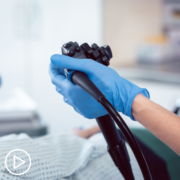Research Advances in Colon Cancer Screening and Detection
Research Advances in Colon Cancer Screening and Detection from Patient Empowerment Network on Vimeo.
What are the latest research advances in colon cancer screening and detection? Dr. Suneel Kamath explores cutting-edge screening modalities, including a noninvasive test and innovative blood tests.
Dr. Suneel Kamath is a medical oncologist at the Cleveland Clinic Taussig Cancer Center. Learn more about Dr. Kamath.
See More from DETECT Colon Cancer
Related Resources:

|

|

|
Transcript:
Katherine:
The American Society of Clinical Oncology annual meeting just wrapped up. What were the highlights from the meeting related to colon cancer screening and detection?
Dr. Kamath:
This was some evidence that came out prior to the meeting but there was quite a bit of buzz about it at ASCO itself. There’s a number of new screening modalities that have obtained their FDA approvals or have had major data releases for, which have looked extremely promising. The first one that comes to mind is the ColoSense test. This is an RNA-based stool test. It’s a stool test similar to Cologuard but it’s a slightly different technology where it’s using RNA instead of DNA like Cologuard did.
Similar to many of the other tools, it’s showing excellent performance in terms of how sensitive it is to detecting colon cancer. They showed in a prior publication they could detect almost 95 percent of colorectal cancers. It was also a rather specific test, too, so 88 percent specificity. What this is telling us is that this test if very good at detecting colorectal cancer when it’s there but also, equally importantly, it’s very good at not giving you a false positive, which is also very important with any screening test.
So, we’re really excited to see that. We’re increasingly thinking about noninvasive ways, beyond colonoscopy, that we can improve colon cancer screening.
Katherine:
How does it compare with Cologuard, then?
Dr. Kamath:
This one is called ColoSense, yeah. I would say both of these numbers in terms of the sensitivity, meaning that’s the level of detection. If someone does have colorectal cancer, how well do you detect that. That sensitivity of almost 95 percent is definitely a little bit higher. Specificity is also, I would say, a little bit higher. I do think that this test would likely both detect more colorectal cancers that Cologuard would and it would also give you fewer false positives at the same time.
Katherine:
And is this going to be something that people can take the test at home?
Dr. Kamath:
Yes. This should be because it says a stool-based test. I’m sure a lot of the logistics would still need to be worked out, as with any new test. Having the kit sent to the primary care doctors’ offices and things like that. Arranging for that infrastructure, I’m sure, will take some time. But, yes, this test is pretty easy and simple to do. It should be the same as sending in any other stool-based test into a lab.
Katherine:
Is there other research you’re excited about?
Dr. Kamath:
Yes. Another one that I’m really excited about is there are these blood-based screening tests as well. A couple are coming to mind. One is from Guardant Health. They have been developing this assay specific for colorectal screening for some time. They’ve also been talking about their data for a blood-based test.
For them, the number is also still quite good. They’re saying that the sensitivity is about 83%, so maybe a little bit lower than the RNA one but specificity is 90 percent. So, maybe actually a little bit better with that. So, I’m very excited about this one because this is a blood-based test that could be done at a doctor’s office. We all know practicalities are if you can just order a test in the lab and have someone get a draw the same as getting your lipid panel checked or other things that are routinely done, that’s very easy to do and you can be pretty certain someone’s going to follow through on that.
Whereas, we know with these stool-based tests, it’s about a third to half of patients, even though you send them home with a kit, you may not get the specimen back at all.



